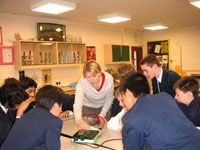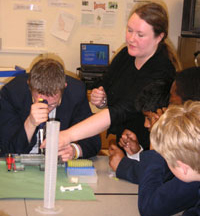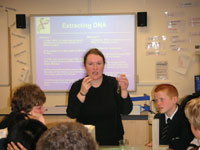Inspirational lessons in the science class Inspire article
Naheed Alizadeh from Imperial College, London, UK, explains how and why the INSPIRE project is trying to make inspirational science lessons, clubs, and master classes regular features of the state school timetable in the UK.

Alizadeh
INSPIRE (INnovative Scheme for Post-docs In Research and Education) arose in response to the well-known concern that fewer students are studying science in schools and universities. This decline has, in turn, led to fewer qualified science teachers, with pupils often being taught by staff who have limited formal qualifications in the subject or who graduated in their subjects many years ago. Thus, an increasing number of science teachers lack the necessary scientific experience and confidence to communicate science and current developments in science.
Imperial Collegew1 and its partners, GlaxoSmithKlinew2 and the Specialist Schools and Academies Trustw3, are working together to reverse this trend. INSPIRE, launched by UK Prime Minister Tony Blair in 2002, employs post-doctoral research assistants (‘post-docs’, those who have already completed a PhD) from a science, engineering or medical-related discipline on two-year contracts. They spend 50% of their time in partner schools teaching the science curriculum and working towards a qualified teacher status. The remainder of each post-doc’s time is spent doing research at Imperial College in their chosen field.
In addition, post-docs use their scientific expertise and experience of university and research to help schools run science-based activities such as master classes, science clubs, university-level training for A-level students (ages 16-18), careers advice, science conferences, and student visits to university research laboratories.
Although the post-docs are placed long-term in secondary schools, they are also sent for one-week placements in primary schools. This helps them to find out how science is taught at the primary level and how it progresses into secondary schools. Some children from local primary schools take part in master classes or science clubs run by INSPIRE post-docs at the secondary school.
“We studied crime scene investigation, which included using ink samples with chromatography paper. The next week, we researched magnets, magnetic breakfast cereals, attracting and repelling and a magnetic challenge in which we had to move a chocolate bar from one end of a piece of wood to the other. …. I enjoyed the science club.”
Student in Year 5 (age 10/11)
The post-docs are able to take university-style teaching into the classroom not only by referring to their research experience but also by taking equipment not normally seen in school. David, an INSPIRE post-doc and expert in laser technology, impressed his school students with a session on ‘How to Make a Call Across the Atlantic’, exhibiting state-of-the-art fibre optic equipment from Imperial College. Jenny, another INSPIRE post-doc and a specialist in pig nutrition, wowed her students with the dissection of a stillborn piglet. The INSPIRE scheme thus allows David and Jenny to bring aspects of their everyday research – an unknown world to most school students – into the classroom.

Alizadeh
These benefits do not end when the post-doc leaves, however, as Imperial College continues to support the INSPIRE schools after the end of their scheme. School students are invited to experience undergraduate life at the College, visiting the electron microscope facilities or the laser lab, and finding out what it is like to study molecular biology or astronomy. The schools can also have demonstration lectures from other post-doctoral scientists.
The INSPIRE scheme is distinctively different from many other schemes designed to increase participation in science in state schools. It places emphasis on practising post-doctoral scientists (rather than first-degree graduates) teaching science at schools for significant periods of time. Furthermore, the scheme aims to make inspirational science lessons, clubs, and master classes regular features of the schools’ timetable. Prolonged contact enables the students to see the post-docs as positive role models, embodying advanced academic scientific success.
Who benefits from the scheme?
School students who have experienced the post-docs’ enthusiasm and expertise express great appreciation of what INSPIRE has brought to the classroom.
“[In] a biology master-class in molecular biology [we gained] an insight into a university-style event, […] enjoyed the experience and had the chance to use [modern] lab technology and equipment in a classroom.”
Year 12 biology student (age 17)
Schools who have experienced the scheme are keen to have more post-docs and to continue their commitment to INSPIRE. The post-doctoral researcher teachers not only challenged the orthodoxy of how some aspects of science are taught and offered a fresh approach, but also added a dimension of authority with their extra scientific expertise. Post-docs bring a depth of current scientific knowledge that less-experienced scientists lack, and when this is combined with a willingness to share this knowledge with students and teachers, it can enrich the scientific culture of the whole school.
Teachers find that the INSPIRE post-docs bring a wealth of information on cutting-edge research, allowing the teachers to update their knowledge in that area of science and giving them confidence to teach it better. Many teachers ask the post-docs to leave their presentations behind for further use in the classroom.
For the post-docs, the INSPIRE scheme is attractive because it allows them to attain a teaching qualification without dropping their research – and to do this while earning more than a trainee teacher. One post-doc explains:

Alizadeh
“INSPIRE allows post-docs to span two disciplines: science and education. The unique fusion enables a post-doc to experience teaching without having to commit immediately to a career change. For a post-doc to move out of science is a massive decision, [so] this scheme is a perfect vehicle to enable post-docs to achieve this transition or to return to science with a much broader understanding of how to teach science within a university setting.”
Whether the post-docs decide to stay in research or to move into school teaching at the end of the two years, most of them say they enjoy the opportunity to investigate an alternative career, motivate and work with young people, bring science to life and have a huge – and ongoing – impact on science lessons at school. David describes some further benefits:
“I picked up management skills, how to organise people and motivate them. It also helped me to build up confidence in public speaking and belief in my own abilities. Teaching helped me to refresh my knowledge and broaden it, which can feed back into my work in the lab.”
The overall responses of the post-docs’ research supervisors have also been very positive – they get a free part-time post-doc as well as money for the research consumables – even though some initially had their doubts about adapting research projects to fit the INSPIRE post-doc’s timetable. It all comes down to careful planning of work and choice of project to ensure success.
The future of INSPIRE
The INSPIRE scheme has completed its first four years, and already, the signs are very positive:
- Ten post-docs from the first, second and third cohorts completed their PGCE over these four years. Five of them have changed careers and chosen school teaching.
- Every time two post-doc positions are advertised for the new cohort, 200 applications are submitted.
- The scheme has been positively judged by Roehampton University, the independent evaluation body.
- INSPIRE has been reported positively in the press, including articles in Nature (Peplow, 2004) and the Financial Times (Kelly, 2005).
Finding funding to continue the scheme, however, is not as straightforward as recruiting enthusiastic scientists and schools. Although GlaxoSmithKline provided a large initial sum of money and the Training and Development Agency for Schoolsw4, responsible for funding teacher training in the UK, has been very supportive, the main government departments responsible for research and education have tended to say that it was other department’s responsibility. The pilot scheme received welcome initial funding from the Department for Education and Skillsw5 but this was not enough for INSPIRE to be extended to other universities.
Nonetheless, Imperial College is keen to replicate this successful scheme on a national scale: it is launching a new national initiative based on similar principles but in a more time- and cost-effective mode. The new scheme, to be launched in September 2007, offers post-doctoral researchers and PhD graduates at the end of their research a seven-month teacher training course (PGCE – normally one year) attached to two months of INSPIRE activities in schools, including master classes, science clubs, and university visits. Imperial College is actively seeking new sponsors to enable many more schools, their pupils and post-docs across the country to benefit from this exciting scheme.
How to get involved
How to apply to be an INSPIRE post-doc
Vacancies for new INSPIRE post-docs are advertised, for example, on www.jobs.ac.uk
How to get an INSPIRE post-doc in your school
Schools that are interested in hosting an INSPIRE post-doc can contact Naheed Alizadeh, the Director of the INSPIRE project (s.alizadeh@imperial.ac.uk). With the help of the Specialist Schools and Academies Trust, Imperial College selects those schools most likely to benefit from the scheme.
Help is at hand
If you would like advice about setting up a similar scheme in your own country, Naheed Alizadeh, the Director of the INSPIRE project, would be happy to help. E-mail: s.alizadeh@imperial.ac.uk
References
- Peplow M (2004) Doing it for the kids. Nature 430: 286-287.
- Download the article free of charge here, or subscribe to Nature today: www.nature.com/subscribe
- Kelly J (2005) The Stewards School: Inspiration in the classroom. Financial Times, 26 Feb
Web References
- w1 – Imperial College website
- w2 – GlaxoSmithKline website
- w3 – The Specialist Schools and Academies Trust website
- w4 – The Training and Development Agency for Schools website
- w5 – The Department for Education and Skills website
Resources
- For more information on INSPIRE, visit: www.imperial.ac.uk/inspire





